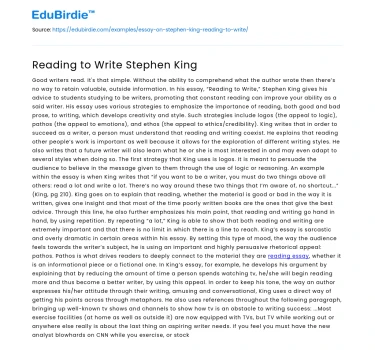Good writers read. It's that simple. Without the ability to comprehend what the author wrote then there’s no way to retain valuable, outside information. In his essay, “Reading to Write,” Stephen King gives his advice to students studying to be writers, promoting that constant reading can improve your ability as a said writer. His essay uses various strategies to emphasize the importance of reading, both good and bad prose, to writing, which develops creativity and style. Such strategies include logos (the appeal to logic), pathos (the appeal to emotions), and ethos (the appeal to ethics/credibility). King writes that in order to succeed as a writer, a person must understand that reading and writing coexist. He explains that reading other people’s work is important as well because it allows for the exploration of different writing styles. He also writes that a future writer will also learn what he or she is most interested in and may even adapt to several styles when doing so.
The first strategy that King uses is logos. It is meant to persuade the audience to believe in the message given to them through the use of logic or reasoning. An example within the essay is when King writes that “if you want to be a writer, you must do two things above all others: read a lot and write a lot. There’s no way around these two things that I’m aware of, no shortcut...” (King, pg 210). King goes on to explain that reading, whether the material is good or bad in the way it is written, gives one insight and that most of the time poorly written books are the ones that give the best advice. Through this line, he also further emphasizes his main point, that reading and writing go hand in hand, by using repetition. By repeating “a lot,” King is able to show that both reading and writing are extremely important and that there is no limit in which there is a line to reach.
Save your time!
We can take care of your essay
- Proper editing and formatting
- Free revision, title page, and bibliography
- Flexible prices and money-back guarantee
King’s essay is sarcastic and overly dramatic in certain areas within his essay. By setting this type of mood, the way the audience feels towards the writer’s subject, he is using an important and highly persuasive rhetorical appeal: pathos. Pathos is what drives readers to deeply connect to the material they are reading essay, whether it is an informational piece or a fictional one. In King’s essay, for example, he develops his argument by explaining that by reducing the amount of time a person spends watching tv, he/she will begin reading more and thus become a better writer, by using this appeal. In order to keep his tone, the way an author expresses his/her attitude through their writing, amusing and conversational, King uses a direct way of getting his points across through metaphors. He also uses references throughout the following paragraph, bringing up well-known tv shows and channels to show how tv is an obstacle to writing success:
...Most exercise facilities (at home as well as outside it) are now equipped with TVs, but TV while working out or anywhere else really is about the last thing an aspiring writer needs. If you feel you must have the new analyst blowhards on CNN while you exercise, or stock market blowhards on MSNBC, or the sports blowhards on ESPN, it’s time for you to question how serious you really are about becoming a writer. You must be prepared to do some serious turning inwards toward the life of the imagination, and that means, I’m afraid, that Geraldo, Keith Olbermann, and Jay Leno must go. Reading takes time, and the glass teat takes too much of it…. I’d like to suggest that turning off that endlessly quacking box is apt to improve the quality of your life as well as the quality of your writing. And how much of a sacrifice are we talking about here? How many Fraiser and Er reruns does it take to make one American life complete? How many Richard Simmons infomercials? How many whiteboy/Fatboy Beltway insiders are on CNN? Oh man, don't get me started Jerry-Springer-Dr.-Dre- Judge-Judy-Jerry- Falwell-Donny-and-Marie, I rest my case (King, pg 213).
He uses the phrases “glass teat” and “endlessly quacking box” (King, pg 213) to point out how addictive, immature, and insignificant tv really is. Such metaphors not only lighten up the paragraphs to make them seem more interesting to the audience but also creates a clear, relatable image in the readers’ minds that makes them connect to the message that King is trying to convey.
The final rhetorical strategy that King uses is ethos. King establishes his credibility throughout the essay by first being a well-known author of several works, including The Shining (1977) and It (1986). He is known for his horror and suspense-filled writings which bring out his unique writing style. Throughout his essay, King also writes about his own experience with reading and writing and explains that “[t]here’s no way around these two things…” and that he reads about “...seventy or eighty books a year…” (King, pg 210). By placing these into his essay he shows that he has the experience when it comes to proving that reading and writing do in fact coexist while maintaining an honest tone throughout the essay.
Stephen King’s essay gives insight to future writers on how to become a good writers. He uses the three rhetorical appeals [logos, pathos, and ethos] to give insightful advice based on his own experiences as well as his use of text-to-world examples to convince the audience that without reading, writing cannot exist. He wants to emphasize the importance of reading since it enhances several skills we need in order to write, including the ability to create something that no one else has done before.






 Stuck on your essay?
Stuck on your essay?

